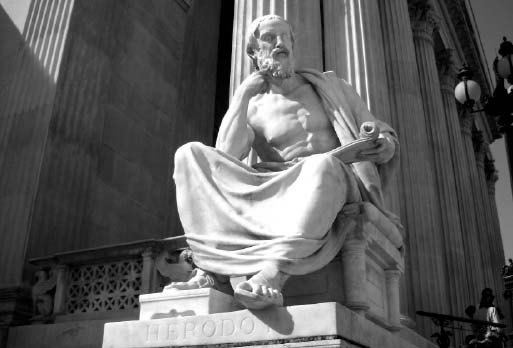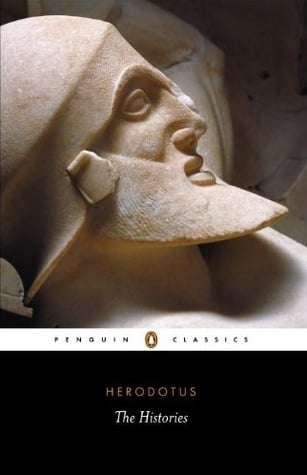Twenty-five centuries ago, in a narrow mountain pass 80-odd miles from Athens, the armies of Iran fought a brutal battle with the armies of Europe. The Iranians were defeated (not that day, but not long thereafter), putting an end to their ambitions to extend their empire into an unwilling West.
The Iranians left, bitterly lamenting the day they had ventured across the Aegean. The Europeans, for their part, erected monuments, one reading, “Here is the spot where once three million men battle against four thousand men from the Peloponnese.” Later, the Spartans, foremost among those Peloponnesians, added a monument of their own to honor the 300 heroes who had borne the brunt of the Iranian assault: “Report to the people of Lacedaemon, o stranger, that here, obedient to their orders, we lie.”
Never mind that there was no Iran then, and certainly no Europe. There was not even a Greece, or Greekness, or Greece-ness. Still, the people whom we call the Greeks felt certain, watching the departing ships of those they called the Medes, that they had fought someone very different from themselves, and with very different views of how men such as they should live: free people under democratic rule, not servants under an autocracy that the phrase “cult of personality” only begins to describe.
That difference is the great, overarching subject of the great book that is Herodotus’ Histories. Its author, a native of Halicarnassus, was alive to see and hear some of the events he recorded concerning the Persian Wars. Halicarnassus, now the site of the Turkish city of Bodrum, was a part of the Persian Empire in Herodotus’ time, and as a young man he saw with his own eyes at least some of the vast armada that the shah of shah called Xerxes threw across the water at the Greeks of the mainland: Thracians, Lamians, Boeotians, Argives, Athenians, Spartans.
He saw such sights, and he remembered. He also traveled, first to neighboring islands, then to the Carian mainland, then to Egypt, where his eyes popped at the sight of all her exotic wonder. He came, in that resonant Homeric phrase, to know many cities and the minds of their people. He recorded his thoughts and speculations about why all those people were so wildly different—why Egyptians wore odd headgear, why Carthaginians ate the things they did, why the people of Pontus favored short swords over long ones. He wondered what language the first humans spoke, and he did not mind that it was not Greek.
Herodotus was especially impressed by tales of peoples he probably never saw himself, such as the Eurasian tribe whose arrival on the scene inclined any Persian in attendance to take refuge behind the city walls:
War, as practiced by the Scythians, has a number of distinctive characteristics. When a Scythian records his first kill, he will gulp down a man’s blood. He will also bring the heads of those he has killed in battle to the king, for a head will secure him a share of whatever booty may have been won, whereas no head means no booty.
The Maenads notwithstanding, that was strange stuff for a Greek audience to ponder. The enduring interest of the Histories is that, in collecting them, Herodotus was not gathering history as such, but instead—and the root of history means something like “looking around, paying close attention, and asking questions”—pioneering the fields of anthropology, journalism, and travel writing all at once. Cicero may have called Herodotus “the father of history,” but many of those who came after him agreed with Plutarch in deeming him “the father of lies”—the charge, that is to say, that is always leveled at first-person journalism, of which Herodotus was an extraordinarily gifted practitioner.
No matter how credible, the Histories are the first full-length surviving work of nonfiction in literature, and by dint of that the book (or, better, collection of books) is a bona fide classic. That characterization is important in considering a pointed question: Does the world need another translation of Herodotus, when so many translations—some in the public domain and available for free online—are so easily accessible?
The answer is yes, as long as the market will bear one. Classics should be translated each generation. And, hard though it may be to believe, it is a generation since the last scholarly translation of Herodotus appeared—David Grene’s, published by the University of Chicago Press.
Tom Holland, himself a noted historian of the Persian Wars, offers a worthy successor in a line that includes Grene, Aubrey de Selincourt, George Campbell Macaulay, and J.B. Bury. His rendering of Herodotus’ Greek is faithful and lucid, preserving the loose, conversational, swift-moving quality of the original. Indeed, Herodotus, a vigorous writer with a deceptively plain prose style, can be thought of, without being too silly to either party in the comparison, as an ancient Hemingway. It is that easy-to-read-on-the-surface aspect that makes Herodotus compulsory reading for second-year Greek students, in just the same way that Hemingway figures, or used to figure, in the undergrad lit curriculum.
It’s what lies between the lines that makes things more interesting in both writers, and here Holland could have been a bit more generous with his notes—though a comprehensive commentary might easily have doubled the size of this already thick book. Suffice it to say that the worst thing that could happen to Herodotus would be to be translated stiffly and formally, and Holland avoids both the mustiness that so often enshrouds classical translations and any temptation to cast the ancient text into the too-chatty, too-modern idiom that makes so many modern translations from whatever language a chore to read.
Xerxes went the way of all flesh, but the Persians pulled themselves together to beat up on their neighbors for another couple of generations. As for the Greeks, soon autocrats of their own would arise. Athenian and Spartan power fell to the might of Macedonia; the Macedonian Empire collapsed as soon as its maker, Alexander, died; the pint-sized empires that followed were soon swallowed up by an emergent Rome. The war between representative rule and autocracy continued, and it goes on today. For that reason if no other, Herodotus is our contemporary, and Tom Holland’s excellent translation, we may hope, will lead a new generation of readers to his pages.

[Herodotus: The Histories, translated by Tom Holland (New York: Penguin Classics) 880 pp., $40.00]

Leave a Reply